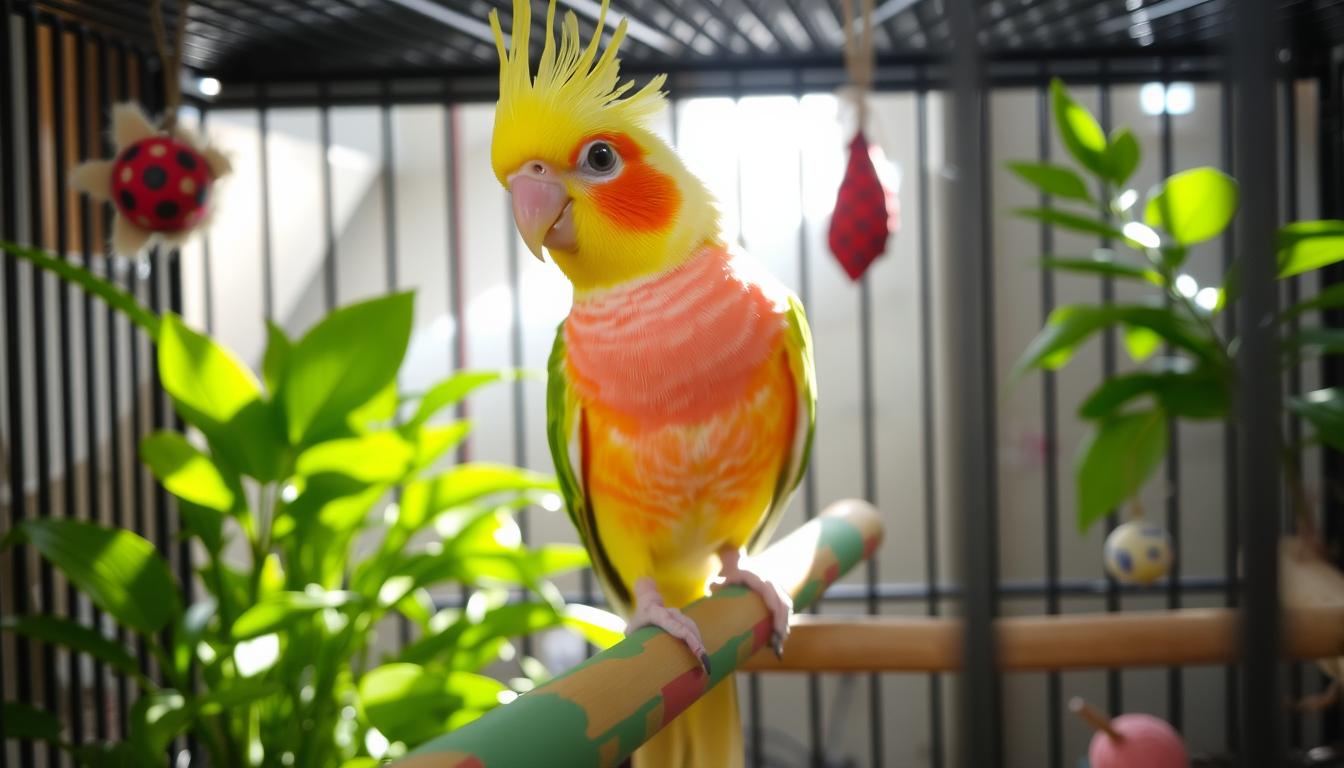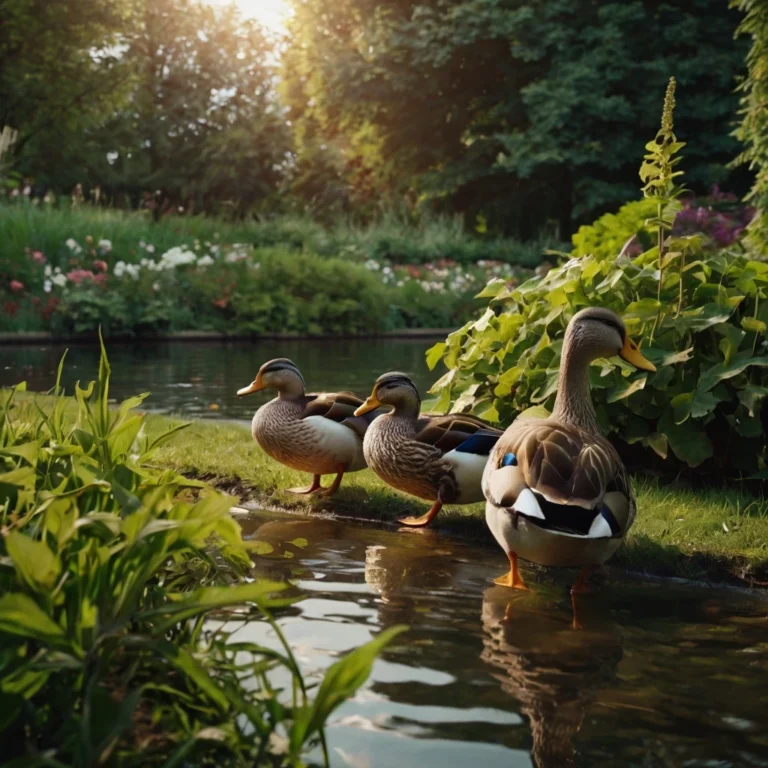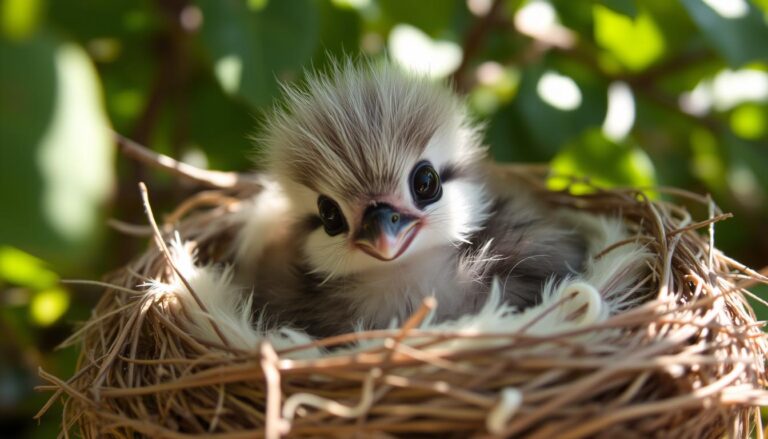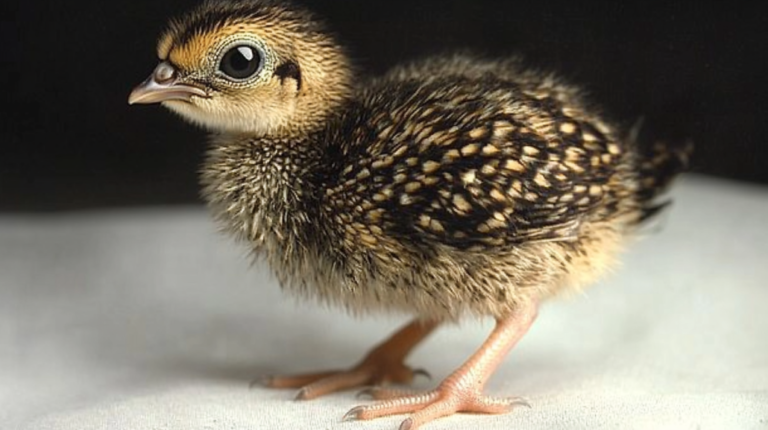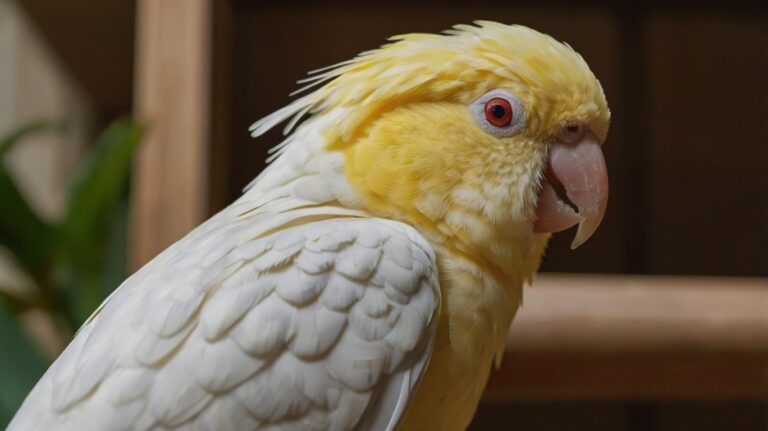How to Care for Your First Cockatiel: A Beginner’s Guide
Looking into your new cockatiel’s eyes fills you with excitement and a sense of duty. Bringing a cockatiel into your life is a big step. It brings joy, laughter, and the chance to form a strong bond with a unique pet bird.
This guide will help you give your cockatiel the care it needs. It’s perfect for both bird lovers and first-timers.
Cockatiels are small parrots from Australia. They are known for being friendly, having a distinctive crest, and making many sounds. They weigh 70 to 120 grams and can live up to 20 years or more with the right care.
Starting this journey with your cockatiel will be rewarding. You’ll learn about the joys and challenges of being a responsible owner.
We’ll explore the details of caring for cockatiels. We’ll talk about the right environment, diet, social behaviors, and health. With this guide, you’ll know how to create a happy home for your cockatiel. It will thrive and become a beloved family member.
Here’s a table providing an overview of the Cockatiel bird:
| Attribute | Details |
|---|---|
| Official Name | Nymphicus hollandicus |
| Common Name | Cockatiel |
| Pet Height | 12-13 inches (30-33 cm) |
| Pet Weight | 2.5-4.5 oz (70-130 g) |
| Lifespan | 15-20 years |
| Smartness Level | Moderate (can learn tricks and words) |
| Engagement in Play | High (enjoys toys, climbing, and interactive play) |
| Human-Friendly | Very (affectionate, social, and likes interaction) |
| Animal-Friendly | Generally good (can coexist with other birds and animals if properly introduced) |
| Favorite Food | Seeds, fruits, vegetables, and pellets |
Table of Contents
Understanding Cockatiels: An Overview
Cockatiels come from the Australian woodlands and scrublands. They are loved for their charming nature and bright colors. These birds weigh between 70 to 120 grams and can live up to 20 years or more with good care.
Physical Characteristics and Colors
Cockatiels are known for their crest and orange cheek patches. They are ground-feeding birds with many color options. You can find them in gray, white-faced, lutino (yellow), and pied colors.
Social Behavior and Personality
Cockatiels are very social and love to interact. They make sounds like whistles, chirps, and even mimicry. They can change their behavior twice a year due to hormones. But, their friendly nature makes them great pets for many.
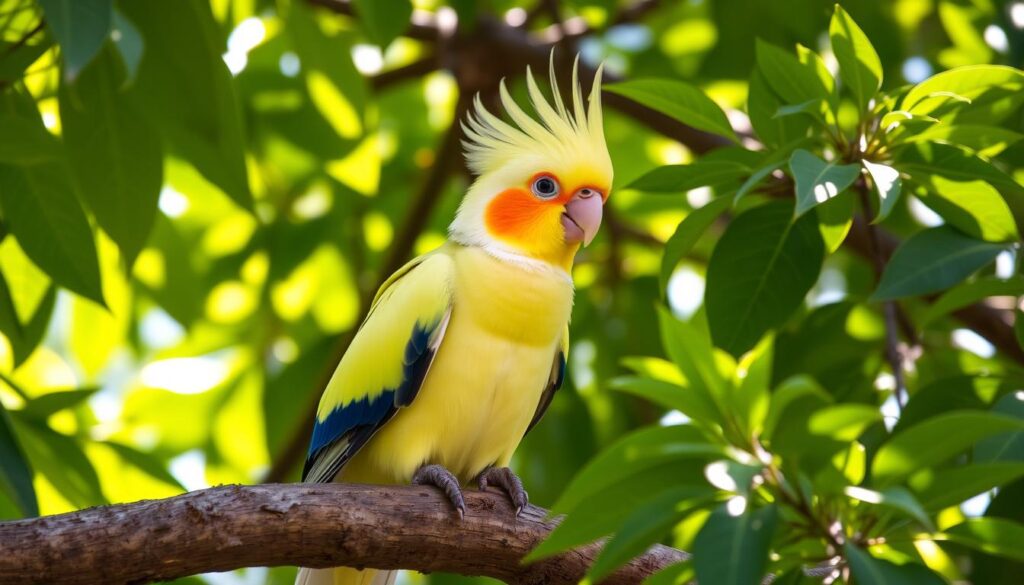
“Cockatiels are truly unique and captivating creatures, with their charming personalities and vibrant colors. As a cockatiel owner, you’ll be rewarded with a lifelong companion that will bring joy and enrichment to your life.”
| Characteristic | Value |
|---|---|
| Average Weight | 70 to 120 grams |
| Lifespan | Up to 20 years or more |
| Common Color Variations | Gray, white-faced, lutino, pied |
| Recommended Initial Cage Size | At least 24″ x 18″ x 24″ |
| Sleep Requirements | 10-12 hours per night |
Choosing the Right Cockatiel for You
Welcoming a cockatiel into your home requires careful thought. There are many breeds and variations to choose from. Your lifestyle and preferences also play a big role. Cockatiels are a favorite among bird lovers, making up about 30% of new bird owners in the U.S. Picking the right cockatiel is key to a happy and fulfilling relationship with your bird.
Different Breeds and Variations
Cockatiels come in many colors and patterns, each with its own charm. You can find everything from the classic gray to the vibrant lutino, pearl, and cinnamon. They usually weigh between 70 to 120 grams and are about 32 cm long. With good care, cockatiels can enjoy a lifespan of 20+ years.
Factors to Consider Before Purchasing
- Dietary needs: Cockatiels need a mix of seeds, pellets, and fresh fruits and veggies. Make sure you know what your chosen breed needs.
- Training and behavior: Cockatiels love to interact. Think about how much time you can dedicate to training and bonding with your bird.
- Health and veterinary care: Cockatiels can get sick, like respiratory infections and fatty liver disease. Find a good avian vet for regular check-ups and quick care when needed.
- Living space: They need a cage that’s at least 24″ x 18″ x 24″. But bigger is better for their exercise and happiness. Think about how much space you have for your bird.
Buying from a reputable breeder who socializes the chicks is important. This helps your bird adjust well to your home. By learning about cockatiels’ needs, you can create a loving home for your new avian companion.
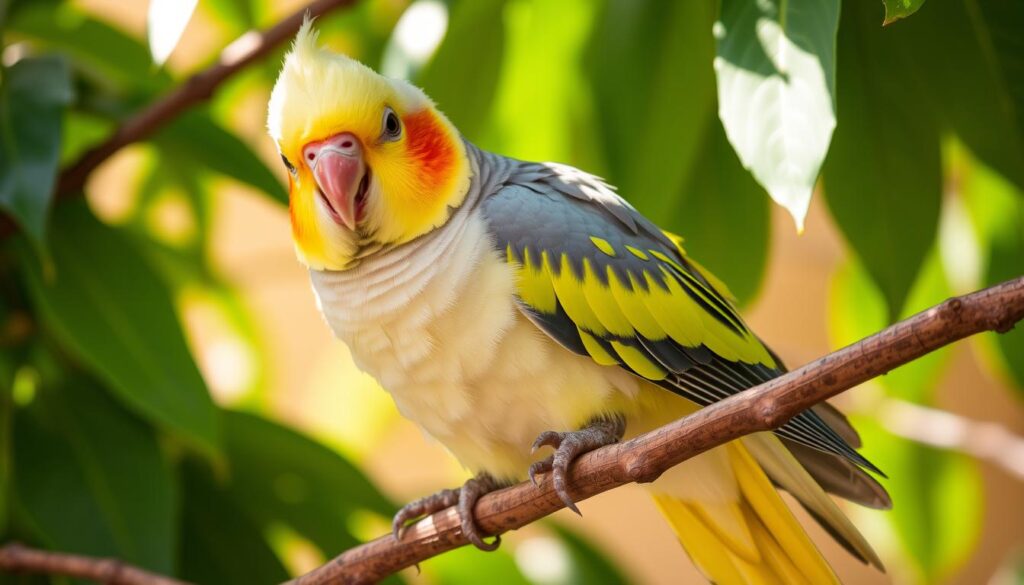
Essential Supplies for Your Cockatiel
As a new cockatiel owner, it’s vital to make sure your bird has everything it needs. This includes the right cage size, food, and toys. Each part of their environment is important for their health and happiness.
Cage Selection and Setup
First, pick a cage that’s big enough for your cockatiel to move around. Look for one with 1/2″ to 3/4″ bar spacing. Choose a metal cage and place it away from drafts and kitchen smells. Add different-sized perches to keep their feet healthy and encourage natural behaviors.
Food and Water Requirements
Feed your cockatiel a balanced diet. This should include high-quality pellets and a seed mix, like ZuPreem’s Sensible Seed. Give them about two teaspoons of seed mix with the pellets every day. Make sure they always have clean, fresh water and change it often.
Toys and Enrichment Items
- Give them toys made from natural fibers like seagrass or coco fiber. These encourage chewing and foraging.
- Soft wood toys, like balsa or pine, and colorful items with bells will keep them entertained.
- A grass feeding mat can stimulate their natural ground-feeding instincts.
- Consider a small bird playstand for their long tail and more perching space.
Change the toys every couple of weeks to keep your cockatiel interested. It’s important to choose high-quality, safe toys for their mental and physical health.
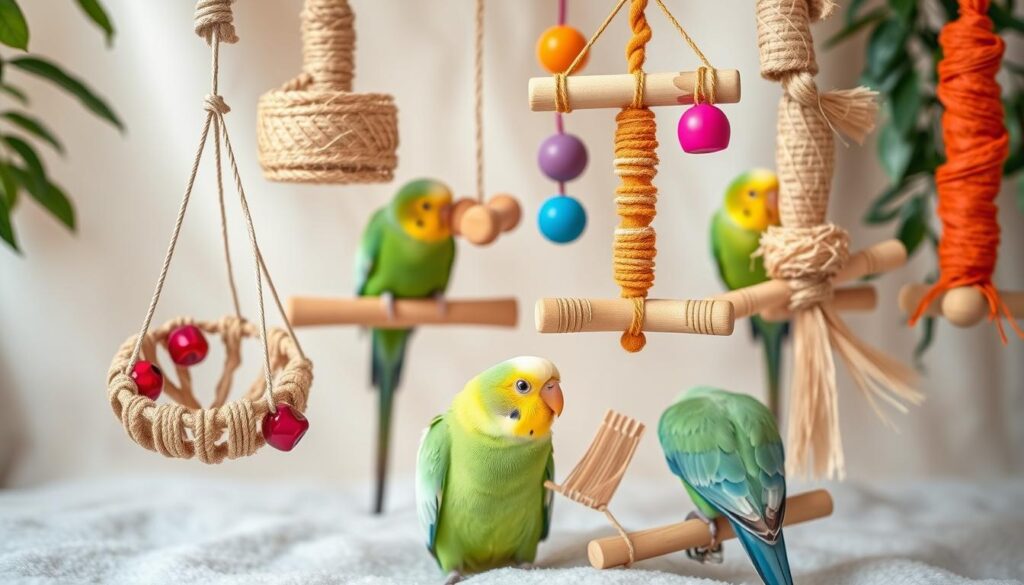
Proper Diet for Your Cockatiel
Keeping your cockatiel’s diet balanced is key to their health and happiness. As their owner, it’s important to know what they need to eat. This way, you can help them live a long and healthy life.
Seeds, Pellets, and Fresh Foods
Your cockatiel needs a mix of high-quality pellets, some seeds, and fresh fruits and veggies. Pellets should be 40-60% of their diet, as they have all the nutrients they need. Seeds should only be 33% of their food, as they are high in fat.
Make up the rest of their diet with fresh foods like apples, berries, and carrots. This variety ensures they get lots of vitamins and fiber. Always introduce new foods slowly and watch how they react.
Foods to Avoid for Cockatiels
There are foods that are bad for cockatiels. Avoid giving them avocado, chocolate, onions, garlic, and fruit seeds or pits. These can be poisonous. Also, don’t give them too many sugary or high-fat foods, as they can cause health problems.
It’s also important to change their water every day. This helps prevent infections and keeps them hydrated. By feeding them a balanced diet, you can help your cockatiel stay healthy and happy for a long time.
| Food Category | Recommended Items | Foods to Avoid |
|---|---|---|
| Fruits | Apples (without seeds), Bananas, Berries, Melons, Peaches (without pits), Pears (without seeds), Plums (without pits) | Avocado, Fruit seeds and pits |
| Vegetables | Broccoli, Carrots, Leafy greens, Peas, Sweet potatoes, Squash, Zucchini | Onions, Garlic |
| Other | Pellets (40-60% of diet), Seeds (up to 33% of diet) | Chocolate, Sugary treats, High-fat foods |
Creating a Comfortable Living Environment
Creating a safe and cozy home is vital for your cockatiel’s happiness. When setting up their space, focus on important details. This ensures your cockatiel will do well.
Cage Placement and Safety
Put the cockatiel’s cage in a quiet, draft-free spot away from direct sunlight. They require 10–12 hours of sleep per night. So, pick a peaceful area. Make sure the cage is stable to avoid accidents or escapes.
Temperature and Humidity Needs
- Keep the temperature between 65°F to 80°F (18°C to 27°C) for their comfort.
- Humidity should be between 40% to 60% to avoid respiratory or feather issues.
- At night, cover three sides of the cage with a light blanket. Leave one side open for air. Use a small night light to prevent “night frights.”
- Keep the area clean and dry to stop harmful fungi. This prevents respiratory problems like aspergillosis.
By making a cozy, temperature-controlled, and well-ventilated space, your cockatiel will thrive. Focus on these environmental factors to give your pet bird a comfortable home.
Daily Care and Maintenance
It’s important to take good care of your cockatiel every day. This keeps them healthy and happy. Let’s go over the main points.
Cleaning the Cage
Keeping the cage clean is a must. Clean your cockatiel’s cage once a week. Change the bedding and wash the food and water bowls well. This keeps the cage fresh and safe from germs.
Health Monitoring and Check-Ups
Watching your cockatiel for signs of sickness is crucial. Look for things like weight loss or unusual breathing. Take them to the vet twice a year for check-ups. This helps catch problems early.
Offering baths, like a cage bathtub or a shower, is good for them. Do this 2-3 times a week. It keeps their feathers clean.
Also, watch their nails and beak. Trim them when needed to avoid health issues. With the right care, your cockatiel will live a long, happy life with you.
“Providing a clean, safe, and enriching environment is the foundation for a happy, healthy cockatiel.”
Socialization and Interaction
Getting your cockatiel involved in your daily life is key for a strong bond and its happiness. These pet birds love to be around people and need regular interaction. It’s important for their emotional and behavioral health.
Building Trust with Your Cockatiel
Developing trust with your cockatiel happens gradually. Give your bird time to get used to its new home before trying to get close. Start by moving slowly, speaking softly, and offering treats it likes.
Watch how your bird acts. If it seems relaxed and preens, it’s getting more comfortable and trusting you.
Engaging Activities for Bonding
- Give your cockatiel time out of its cage in a safe room. This lets it explore and get some exercise.
- Teach it to step onto your hand with the “step up” command. It’s perfect for building connections.
- Talk to your cockatiel, read to it, or play calming music. This makes it feel safe and close to you.
- If you’re away a lot, think about getting another cockatiel as a friend. But do it slowly and carefully to make sure they get along.
Creating a strong bond with your cockatiel takes time and effort. Be patient, gentle, and positive. This will make your relationship with your feathered friend rewarding and fulfilling.
| Socialization Metric | Importance |
|---|---|
| Birds living in flocks | Cockatiels are highly social and typically live in flocks, highlighting the need for socialization to meet their emotional needs. |
| Ratio of socialization effects | Without proper socialization, cockatiels may become shy, fearful, or even aggressive, emphasizing the significant impact of socialization on their behavior. |
| Time for trust building | Building trust with a cockatiel can take varying amounts of time depending on the individual bird’s comfort level, underscoring the importance of patience and gradual interactions. |
Training Your Cockatiel
Cockatiels are smart and love to interact. Teaching them basic commands and tricks can make your bond stronger. It also keeps them mentally active and happy. With patience and positive rewards, your cockatiel will become a well-behaved friend.
Basic Commands and Tricks
Begin with the “step up” command. This lets your cockatiel safely land on your finger. It’s a great start for more training. You can also teach them to “come,” “stay,” and “step down.”
They can even learn fun tricks like shaking their head or flying on command. You might even get them to whistle a tune.
Tips for Successful Training
- Use positive reinforcement. Give treats like millet sprays for good behavior.
- Be patient and consistent. Cockatiels learn best with repetition and a calm approach.
- Keep training sessions short and frequent. Aim for 5-10 minutes daily.
- Build trust gradually. Let your cockatiel get used to you before training.
- Avoid punishment. Never yell or physically discipline your cockatiel. It can hurt your bond.
With patience and consistent training, you can teach your cockatiel many tricks. This will make your bond stronger and their life more interesting. The secret to cockatiel training is a positive, loving environment.
Recognizing Health Issues in Cockatiels
As cockatiel owners, it’s important to watch your bird’s health closely. These birds can get sick easily, and catching it early is key. Knowing the signs helps you get your avian companions the care they need.
Common Illnesses and Symptoms
Respiratory infections are common in cockatiels. Look for signs like hard breathing, wheezing, or runny noses. Psittacosis, a bacterial infection, can make them tired, lose weight, and change their droppings.
Fatty liver disease is another issue. It’s caused by bad diet or metabolic problems. Symptoms include less eating and losing weight. Aspergillosis, a fungal infection, can also cause breathing problems and less activity. Egg binding is a serious issue where a female can’t pass an egg. It’s a big problem that needs quick vet help.
When to Seek Veterinary Care
Get vet help fast if your cockatiel acts differently, eats less, or looks sick. Signs like being tired, not eating, or breathing hard are serious. Early treatment can save your bird’s life. Keeping their area clean and feeding them right helps prevent many sicknesses.
“Watching for signs of illness and seeking veterinary care at the first indication of a problem is the best way to ensure the long-term health and well-being of your cockatiel.”
By being careful and working with a vet, your cockatiel can live a long, happy life. Remember, taking care of them early and often is the best way to keep them healthy and happy.
Enjoying Life with Your Cockatiel
Cockatiels are very social and smart. They find joy in playing and developing a strong bond with their owners. Try dancing, hide-and-seek, or teaching them sounds. These activities make your bond stronger and keep their minds sharp.
Fun Activities to Do Together
Cockatiels enjoy exploring and finding new things. Set up toys and perches in their cage to keep them active. Try foraging toys, ladders, and ropes for climbing.
Interactive games like mirror play and fetch are great for bonding. They make your time together fun and engaging.
Traveling with Your Cockatiel
Traveling with your cockatiel needs careful planning. Use a safe carrier or harness outside. They find joy in playing and developing a strong bond with their owners.
Pack their favorite toys and a comfy perch for their comfort. Always check with a vet before long trips or big changes. This ensures their safety and happiness.

